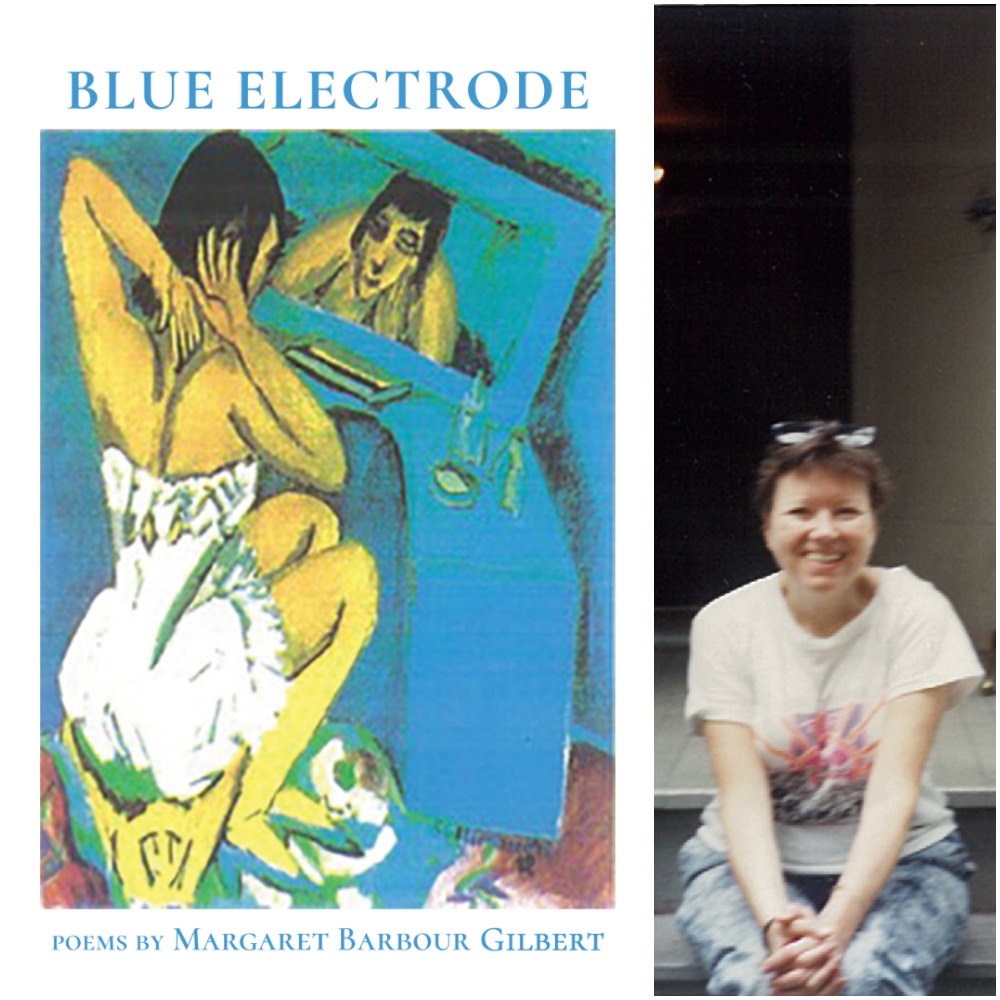BLUE ELECTRODE
1.
At the moment I am all wired up and
buckled into a $9,000 belt with tape recorder
— getting a 24-hour recording of my brain.
Like Medusa or one of the
Gorgon Ladies, I have over 100 tiny blue
electrodes all over my scalp, wires coming
out of my head and a collar of blue
electrodes around my neck. Paste like clam
dip is smeared through my hair, so
the electrodes will stay in place. I am
planning to call my mother later to see
if she triggers off Seizure Activity.
2.
Among plastic flowers
and eisinglass curtains,
a china chest,
she comes bearing gifts
to the glassed-in receptacle,
a visitor to a grave site,
and mourns the seizures
dressed in black.
Yes, my mother thinks to herself,
tying her torn scarf,
the words Epilepsy and Woe
are synonymous.
3.
I tie a blue scarf over my head,
so that no one will see the thousands
of tiny wires attached to my skull,
my hair, a mass of twisting snakes,
if I later go out to the grocery.
This is the blue scarf my father
had wanted me to give my mother —
a pale blue the predominant color
with tiny yellow flowers —
I mailed the scarf to her,
but she returned it.
*****
“The poet’s work to establish agency in the midst of sickness is so clear and hard fought, that one is filled with admiration and wonderment at the ability to carry the reader so deep into her journey with all of its subcurrents.”
–MARY STEWART HAMMOND – author of Out of Canaan (W.W. Norton, 1991) & Entering History (W.W. Norton, 2016).
*****
“These poems interrogate seizure disorder and recovery, its spectrum, the people around it, family, community. In those waters swim a sense of history, distortion, victimhood, the inevitability of scapegoating, in fact, discrimination and racism. The poems themselves seize. Their strongest light is their willingness to inhabit the very “kindling” of the neurons, “the highway clothed in goldenrod.” Indeed, as the poet writes in “Blue Electrode,” the title poem, “Yes, my mother thinks to herself/ tying her torn scarf,/ the words Epilepsy and Woe/ are synonymous.”
–RALPH BURNS – author of but not yet (Lynx House Press, 2017) Winner of The Blue Lynx Poetry Prize, & Ghost Notes (Oberlin College Press, 2000), Winner of The Field Poetry Prize.






Lynette G. Esposito –
https://northofoxford.wordpress.com/2022/06/01/blue-electrode-by-margaret-barbour-gilbert/
midwest book review –
http://www.midwestbookreview.com/mbw/may_22.htm#dianedonovan
Blue Electrode is a poetic journey through illness (seizure disorder, specifically…thus, the title’s reference) and healing that captures, in powerful visual history, the evolution of a life buffeted not only by illness, but the prejudice surrounding it.
Some of these poems reflect on the monster within, as in ‘Gorgon’, in which the author considers “I am one of those,/unstable as water/with wings and snaky hair,/whose look turns men to stone./Woman, island, I live alone.”
Others are stark representations of the medical experience: “At the moment I am all wired up and/buckled into a $9,000 belt with tape recorder/-getting a 24-hour recording of my brain./Like Medusa or one of the/Gorgon Ladies, I have over 100 tiny blue/electrodes all over my scalp, wires coming/out of my head and a collar of blue/electrodes around my neck.”
Individually, these works capture experiences of the moment as the poet struggles to transcend her own sickness with personhood. Collectively, Blue Electrode holds the ability to not just captivate, but grab and shake its readers in its own associative seizure of life, death, and the worlds that lie between; whether they involve illness or romance.
They also represent diverse poetic forms and structures. “County Graveyard in Alabama,” for example, is a villanelle, and “Thanksgiving Dinner” is a sonnet, and “The Blue Hour” is an elegy in free verse. Gilbert displays equal skill in moving between these forms, as well as an astute ability to employ the particular poetic device at its best.
Those with epilepsy well know its impact on the entire family, and these wider-ranging subjects are included in the poems, as in “Little Sickness” which captures a mother’s reflections about her daughter’s sickness: “I feel sure that, as a child, you had/Petit Mal. You looked and sounded as if/you were day dreaming, and you did not/respond or hear or react when we/talked to you.” It should be noted that the book’s title, Blue Electrode, refers to one of the electrodes used to hook a person up to an EEG, a machine which records the brain for neurological disorders (only one of which is epilepsy).
From a family challenged by financial burdens caused by illness and love to vivid descriptions of having a seizure (“My eyes are closed/the look that you see on buses/when a blind person with a dog/and stick gets on and sits in/the front of the bus.”), Blue Electrode is a captivating portrait of a life in epilepsy that needs to be included not just in poetry collections, but in the health sections of any library strong in self-help and individual experience.
The poems are ultimately about healing and a life that has transcended epilepsy.
The author has been seizure-free since 1989. Blue Electrode is her second chapbook of poems. Swallow Barn, a new collection, will be published by Dancing Girl Press of Chicago in 2022.